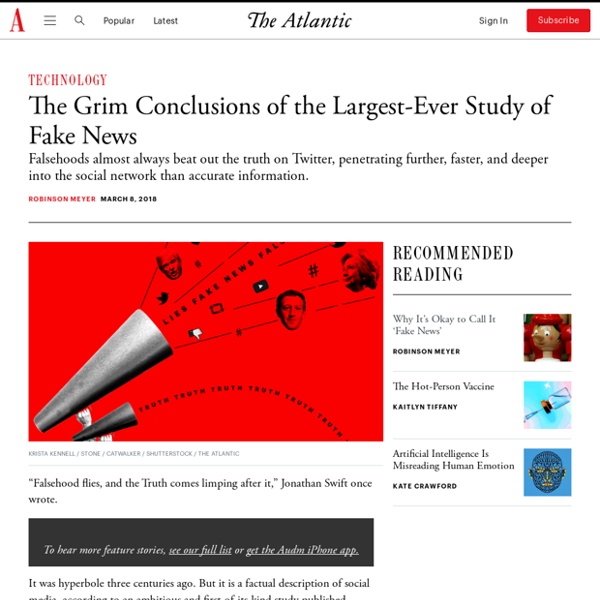The Psychology Behind Fake News
It’s hard to venture online these days—or switch on any cable network—without coming across a heated discussion over “fake news.” Basic facts and figures, ranging from crowd sizes to poll numbers to whether or not it rained, now appear to be under negotiation. For many media consumers, it can feel as if we are living through an entirely new dystopian era, with each news cycle or press conference sending us further down the rabbit hole.
Verify: Was there a blackout in DC during protests?
Is there any evidence that the government 'jammed' protesters' phones, stopping them from making calls or posting online? Is there any evidence that the government jammed protesters' phones, stopping them from making calls or protesting online? There is no evidence of this. Peter Newsham- Chief of Police- Metropolitan Police Department
'Fiction is outperforming reality': how YouTube's algorithm distorts truth
It was one of January’s most viral videos. Logan Paul, a YouTube celebrity, stumbles across a dead man hanging from a tree. The 22-year-old, who is in a Japanese forest famous as a suicide spot, is visibly shocked, then amused. “Dude, his hands are purple,” he says, before turning to his friends and giggling. “You never stand next to a dead guy?” Paul, who has 16 million mostly teen subscribers to his YouTube channel, removed the video from YouTube 24 hours later amid a furious backlash.
Inside the Bizarre Misinformation Campaign About a Hoax Blackout in DC
Demonstrators in Washington, DC on Sunday.Photo by Alex Wong/Getty Images For indispensable reporting on the coronavirus crisis and more, subscribe to Mother Jones' newsletters. In the late hours of Sunday and early Monday morning, as Washington, DC, was in the throes of massive protests and police used teargas, rubber bullets, and what appeared to be flashbangs on demonstrators drawn out by the death of George Floyd, something confusing started happening online: the hashtag #DCBlackout started going viral on Twitter, accompanied by similar posts on Facebook and Reddit, claiming that sometime at around 1 am, internet service had gone down throughout the district, blocking people from using the internet or posting what was happening on social media.
English Language Arts and Literacy, Science, Health and Physical Education, Engineering & Technology
Ever have an argument with someone, and no matter how many facts you provide, you just can’t get that person to see it your way? One big reason for this is cognitive bias, which is a limitation in our thinking that can cause flaws in our judgement. Confirmation bias is a specific type of cognitive bias that motivates us to seek out information we already believe and ignore or minimize facts that threaten what we believe.
Discussing the Impacts of Social Media Algorithms
Introduction When Facebook acquired Instagram in 2012, many people were confused by the purchase. By all definitions, Instagram seemed to be the antithesis of Facebook.
Americans relying more on anecdotes than facts, which comes at a cost: study
WASHINGTON, Jan. 16 (Xinhua) -- Americans' reliance on facts to discuss public issues has declined significantly in the past two decades, according to a report by U.S. global policy think tank RAND Corporation on Tuesday. The phenomenon, known as "truth decay", is defined by increasing disagreement about facts, a blurring between opinion and fact, an increase in the relative volume of opinion and personal experience over fact, and declining trust in formerly respected sources of factual information, the report says. The situation is exacerbated by changes in the ways Americans consume information -- particularly via social media and cable news.
How to Use the Vaping and Juuling Trend to Teach Media Literacy
Help students recognize and analyze age-old advertising tricks. It's estimated that 3 million students vape, a shocking stat to many but not to teachers, who have seen it take over school campuses firsthand. Many of these young people use one e-cigarette or vaping product in particular: Juul.



